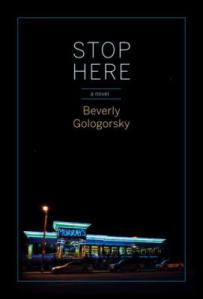STOP HERE captures lives of working people in time of war and recession

Win a copy of STOP HERE! Leave a comment and you're entered.
This contest has ended.
Stop Here
By Beverly Gologorsky
Seven Stories Press; November 19, 2013
233 pages, $16.95 (paperback original)
Stop Here is a short but moving novel that captures the zeitgeist of working class Long Island in the first decade of the new century, as the “War on Terror” muddles on and the recession takes hold. It follows the lives of several characters connected through their employment at Murray’s Diner; each is coping with the type of mundane challenges, conflicts, and problems we all deal with, but that you don’t often find depicted this accurately and honestly in fiction. But it’s not a depressing book. In fact, it is inspiring to watch these fully fleshed-out characters struggle on a daily basis to find love, make sense of relationships both personal and professional, and help family members who are ill or making poor decisions.
The book feels almost like a series of interconnected stories, as the chapters shift from one character to another. We get to know each person intimately in the chapters in which they are in the spotlight, but they appear as supporting characters in most of the other chapters, lending the story a level of continuity and coherence that generates the narrative momentum of a novel.
Ava, Rosalyn, and Mila are waitresses at the diner; Bruce and Nick are the cooks; Sylvie is owner Murray’s new wife. Ava is a single mother whose husband was killed in the first Iraq War in 1991. Mila’s daughter Darla wants to enlist in order to earn money for college because she and Mila have no other financial options (a theme explored powerfully in Cara Hoffmann's recent novel Be Safe I Love You, reviewed here: http://wp.me/p3EtWm-aq). Bruce and Shelly’s son Michael is in Iraq, causing his father to revisit his own traumatic wartime experiences. Nick’s daughter Glory wants to serve as a “peace witness” in the West Bank and other hot spots. Nick is doing battle with a mild case of PTSD, while Bruce has become obsessed and depressed.
Rosalyn, single, beautiful, and 40, has a lucrative second job that she keeps secret from her close friends Ava and Mila. She is also caring for her curmudgeonly widower father. Murray is a hard-charging, heavy-handed businessman and zealous supporter of the wars in Iraq and Afghanistan. But he yearns for a wife to fill the void in his emotional life; eventually he finds the lovely and much younger Sylvie, who doesn’t quite return Murray’s ardor but knows he can offer her stability and a high standard of living. They have moved into a contemporary beach house, which Sylvie is furnishing and decorating as an expression of her creative impulses. Not surprisingly, she is driven outside her marriage to fulfill her own emotional needs.
Each chapter in Stop Here weaves another strand into this complex tapestry of lives, achieving the kind of interconnected complexity that exists in the lives of real people. Gologorsky has written a memorable book; her compassion for and insight into the lives of real people with dreams and burdens in equal measure make these characters live both on and off the page. They are heroes on a different battlefield. Take a few hours to stop at Murray's Diner and get to know the people who work there. You won't soon forget them or their tragedies and small triumphs.


